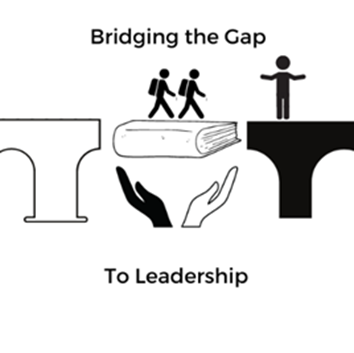Racial disparities within Higher Education are not new and it is widely accepted that we have a problem that needs addressing. Mary Makinde is a Senior Lecturer in Forensic Investigation and Strategic Lead on Closing Our Gap, at Canterbury Christ Church University. As a Strategic Lead, Mary works collaboratively with both colleagues and students to deliver a holistic approach to addressing the outcomes and experiences of Black, Asian, Mixed heritage and Minoritised students.
In this post, Mary discusses why the Bridging the Gap to Leadership programme was set up and its impacts on delivering sustainable change to improve the university experience of Black, Asian, Mixed Heritage and Minoritised Students. We acknowledge the challenges with using homogenising language and terminology with regards to race and ethnicity and that umbrella terms and acronyms do not provide opportunities to gain a nuanced understanding of the impact of race, racism and privilege within different communities. As such, where possible we have disaggregated the data, referred to the specific community in which we are discussing and avoided the use of acronyms.
The Experience of Black, Asian, Mixed Heritage, and Minoritised Ethnic Students in Higher Education
The release of the Closing the Gap report in 2019 by Universities UK and the National Union for Students (and the follow-up report in 2022) highlighted the stark and persistent disparity between the degree outcomes of Black, Asian, Mixed Heritage Minoritised Ethnic students and their White counterparts. In the academic year of 2020/21 around 87% of White students graduated from university with a 1st or 2.1 degree compared to just 69% of Black students. The publication of the Closing the Gap report became a defining moment for the Higher Education sector as the report highlighted the urgent and immediate need for change.
The COVID-19 pandemic and the disproportionate impact of this on Black, Asian, Mixed Heritage and Minoritised Ethnic communities, further drew attention to racial inequalities within the healthcare sector and our wider society. A survey conducted by Health Education England in 2020, captured the experiences of students within healthcare during wave one of the pandemic and found that Black, Asian, Mixed, Heritage and Minoritised Ethnic students were 30% more anxious about the impact of COVID-19 on their future career than their White counterparts. Findings within this report also indicated that Black, Asian, Mixed, Heritage and Minoritised Ethnic students were more likely to consider leaving the profession than their White counterparts as a result of:
• Mental health challenges
• Lack of personal support
• Lack of placement support
• Workload and placement experience during this period.
The Experience of Black, Asian, Mixed, Heritage and Minoritised Ethnic Students Studying Healthcare Professional Programmes
In recent years, many Higher Education Providers (HEPs) have made a formal commitment to addressing the ethnicity awarding gap. In doing so, they have adopted a whole-institutional approach that encompasses working with both academic and professional service departments within their institution. However, racial inequalities within practice learning are rarely addressed as part of the whole-institutional approach. This is particularly important as subjects allied to medicine (e.g. nursing, allied health professionals and midwifery) account for 12.3% of the student population in the United Kingdom (HESA, 2022). As such, if we are to make transformational and long-lasting changes in relation to the ethnicity awarding gap, we must acknowledge that for many students the university experience transcends beyond the walls of the institution and into practice learning.
Students studying professional courses such as those within the health and social care sectors spend up to 50% of their time within practice placements. Practice learning (sometimes referred to as practice education and/or placements) is critical in enabling students to integrate academic learning and professional practice. It is within these real-life settings that students have the opportunity to take what they have learned in the classroom and put it into practice, preparing for employment and developing their own unique professional identity. Black, Asian, Mixed Heritage and Minoritised Ethnic students face significant and unique challenges within the practice learning environment; they encounter psychological, societal and cultural challenges because of their identity (Calvin et al,2011).
Whilst many students report having a positive experience on placements and an enhanced learning experience, a significant proportion of Black, Asian, Mixed Heritage and Minoritised Ethnic students have reported experiencing microaggressions, racism, unconscious bias and discrimination. Black, Asian, Mixed Heritage and Minoritised Ethnic students reported incidences of racism and discrimination from peers, practice supervisors, practice staff and service users. Many also stated that they did not report these incidences at the time to their university and/or a member of the placement team. Their reasons for not reporting were multifaceted but included:
- Fear of repercussions
- Not wanting to be seen as a ‘troublemaker’
- Lack of awareness about reporting mechanisms
- Fear that it may result in them not passing their placement
- The general acceptance of ‘that’s just the way it is’.
More needs to be done by universities to ensure that all students have a truly inclusive learning experience and this includes time spent within practice learning.
The Rationale behind the Bridging the Gap to Leadership project



The rationale for the Bridging the Gap to Leadership project was established from conversations between academic staff and students at Canterbury Christ University and the University of Brighton as a result of both institutions commitment to tackling racial inequalities. Both universities wanted to adopt a collaborative and holistic approach that celebrates diversity, raises cultural awareness and centres the needs and voices of our diverse body of students.
Funded by Health Education England, the Bridging the Gap to Leadership project is an online (remote) placement focused on providing leadership opportunities primarily for Black, Asian, Mixed Heritage and Minoritised Ethnic students. The project also tackles issues of racism and discrimination within practice learning. The project provides placement opportunities primarily for Allied Health Profession courses as well as other health care courses such as mental health nursing. Since the commencement of the project in February 2021, 29 students from a range of ethnic backgrounds (including 5 students who identify as White) have undertaken placements on the project. Depending on course requirements each student spent between 3 to 12 weeks on the placement working alongside peers and colleagues from both universities.
The aims of the Bridging the Gap to Leadership project are as follows:
- To raise awareness of, and tackle issues of discrimination experienced Black, Asian, Mixed Heritage and Minoritised Ethnic students during practice placements
- To enhance the experiences of Black, Asian, Mixed Heritage and Minoritised Ethnic students on practice placements
- To provide leadership development opportunities for Black, Asian, Mixed Heritage and Minoritised Ethnic students
- To promote allyship and foster a sense of belonging within practice placements
- To provide a set of resources for practice educators, students and our placement partners to develop their understanding of race, ethnicity and diversity within the learning and working environment
Working as Partners in Learning
Genuine co-creation and the ethos of partners in learning was established from the onset of the project, with our students leading the way by defining the project and the legacy of their contributions, including how they wanted the project to empower students and practice learning practitioners to be agents of change. Students determined the name and logo of the project as part of this. Across both universities, students work together and they are supported by cross-institution supervision. Through this supervision, students reflect, generate discussions and grapple with complex ideas of inclusion/exclusion within practice learning.
Students on the Bridging the Gap to Leadership placement have used their own placement experiences (either through direct experiences of racism and/or witnessing racism) and gathered experiences from other students through focus groups, interviews and surveys to develop a range of resources for students, practice educators, practice staff, service users and academic staff. These resources include videos, podcasts, posters, guidance documents, animations, Powerpoint presentations, bookmarks and they have co-delivered national webinars and conference presentations.
Resources can be found here:
Videos and animations:
- Providing Allyship to Health Care Students on Placements: click here
- Real Case Scenarios for Educators Discussion: click here
- Supporting Culturally and Linguistically Diverse Students: click here
For our Black, Asian, Mixed Heritage and Minoritised Ethnic students the placement and resources developed have provided a useful, safe and impactful medium to share their lived experiences. For our White students, the project has provided them with a great opportunity to develop their awareness of race, racism, privilege, allyship and how to be an active bystander.
Through this placement, students and academic partners are able to shine a light on the intersectionality of race and other characteristics (e.g. disability, gender, sexuality, mental wellbeing, international students, religion) that can contribute to how a student experiences the practice learning environment. This has resulted in the production of resources that consider the whole-person.
Impact on our Students
All students on the placement have reported having a very positive experience. Students of all ethnicities have stated that the project has provided them with a safe and non-judgmental space to explore their own racial and ethnic identity and the impact it has on their professional practice. Many have continued to be involved in the project after they have completed their placement.
Our White students have said how important the placement has been in educating them about the unique experiences faced by Black, Asian, Mixed Heritage and Minoritised Ethnic students within practice learning and how it may differ from theirs. They have all stated that the placement has empowered them to be an ally and helped to develop skills on how to be an active bystander.
Student feedback:
- ‘This placement has contributed profoundly to developing my skills for professional practice and aided personal development points, such as growing my confidence when working with other professionals and presenting to others. The nature of the virtual placement contributed well to developing my autonomous working skills, managing my workload within the day and improved my time management and organisational skills’
- ‘My favourite aspect of the experience was seeing the development and growth of the other students. Seeing our personal growth, our remarkable achievements and genuine desire to strive for equality was refreshing and encouraging’
- ‘Feeling of being trusted and valued’
- ‘As a person of colour, I’m glad to see these conversations are being had. It makes me feel less isolated’
- ‘This placement provided brilliant opportunities to take the lead on a project and to build my confidence’
- ‘I would likely not have crossed paths with so many senior AHPs had it not been for this placement. This was a fantastic networking experience’
- ‘The placement has given me the opportunity to develop my professional skills and lead a project that leaves a legacy’
- ‘I have been really proud of myself’
- ‘The placement has given me the privilege of making a difference in creating change and enabling more support for culturally and linguistically diverse students in placement’
- ‘The placement made me appreciate that difference is an advantage’
- ‘The skills developed in this project will become extremely relevant in my future practice, helping to make the workspace more inclusive, advocating for minorities, not patronising them, but recognising them as an asset for organisations’
Collaboration across the two institutions proves to be extremely valuable for all involved in the project as it is an opportunity to exchange best practice, challenge existing structures and work collectively towards a common goal. The collaboration provides opportunities to develop a sense of belonging for students as often only a few Black, Asian, Mixed Heritage and Minoritised Ethnic students may be on a course.
Impact on Practice
The outputs of the project have started to have significant and transformative impact on our practice learning providers. Many have reported changes in their professional practice as a result. This includes addressing assessment processes, working with colleagues and students to develop working groups and encouraging students to attend EDI forums, and challenging existing practices to create a more inclusive learning and working environment.
Feedback on Practice
- ‘I really found the information on experiences in practice useful and how we could work together better to support students across academic and practice better. The presentation was fantastic and would be really useful for me to share with my team’
- ‘I found microaggressions very interesting as witnessed this previously. It has provided me with excellent guidance on how to support a Minoritised Ethnic student on future placements’
- Really appreciating the extent to which Black, Asian, Minority Ethnic students are affected and how much we can all support and help change things within not just education but the workplace as a whole’
- ‘Made me more aware and I will adapt my behaviour’
Impact at the Institutional Level
So far, the insights gained from the Bridging the Gap to Leadership project have helped to inform how staff at Canterbury Christ Church University and the University of Brighton work with and support staff to create a learning and working environment that is truly representative of our society, an education for social justice and most significantly has highlighted this importance of working with placement providers to enhance inclusive practice within their organisations.
Acknowledgements
This critical and important work would not have been possible without the contributions and time dedicated by our students. They have all embraced the project with immense positivity, and a passion for change, worn their hearts on their sleeves and created spaces for courageous conversations. For this we thank you. We would also like to acknowledge key stakeholders that have contributed to the project, given feedback and their time.
Acknowledgements to the rest of the team, Helen Carr (Senior Lecturer in Practice Learning, Canterbury Christ Church University), Dr Channine Clarke (Head of Practice Learning and Development, University of Brighton) and Sarah-Jane Ryan (Principal Lecturer in Physiotherapy, University of Brighton).
If you wish to keep up with Bridging the Gap to Leadership, you can follow us on social media here:
Twitter: @bridgingcccuofB
Instagram: bgleadershipcccu_uob
Register FREE to access 2 more articles
We hope you’ve enjoyed your first article on GE Insights. To access 2 more articles for free, register now to join the Government Events community.
(Use discount code CPWR50)




